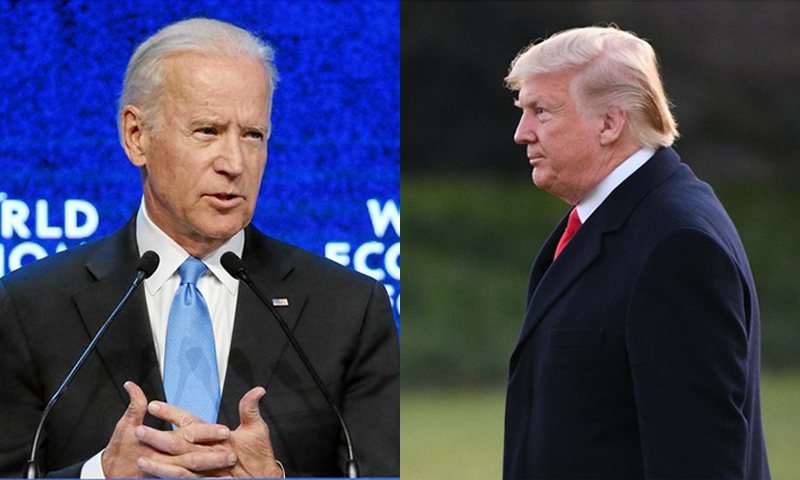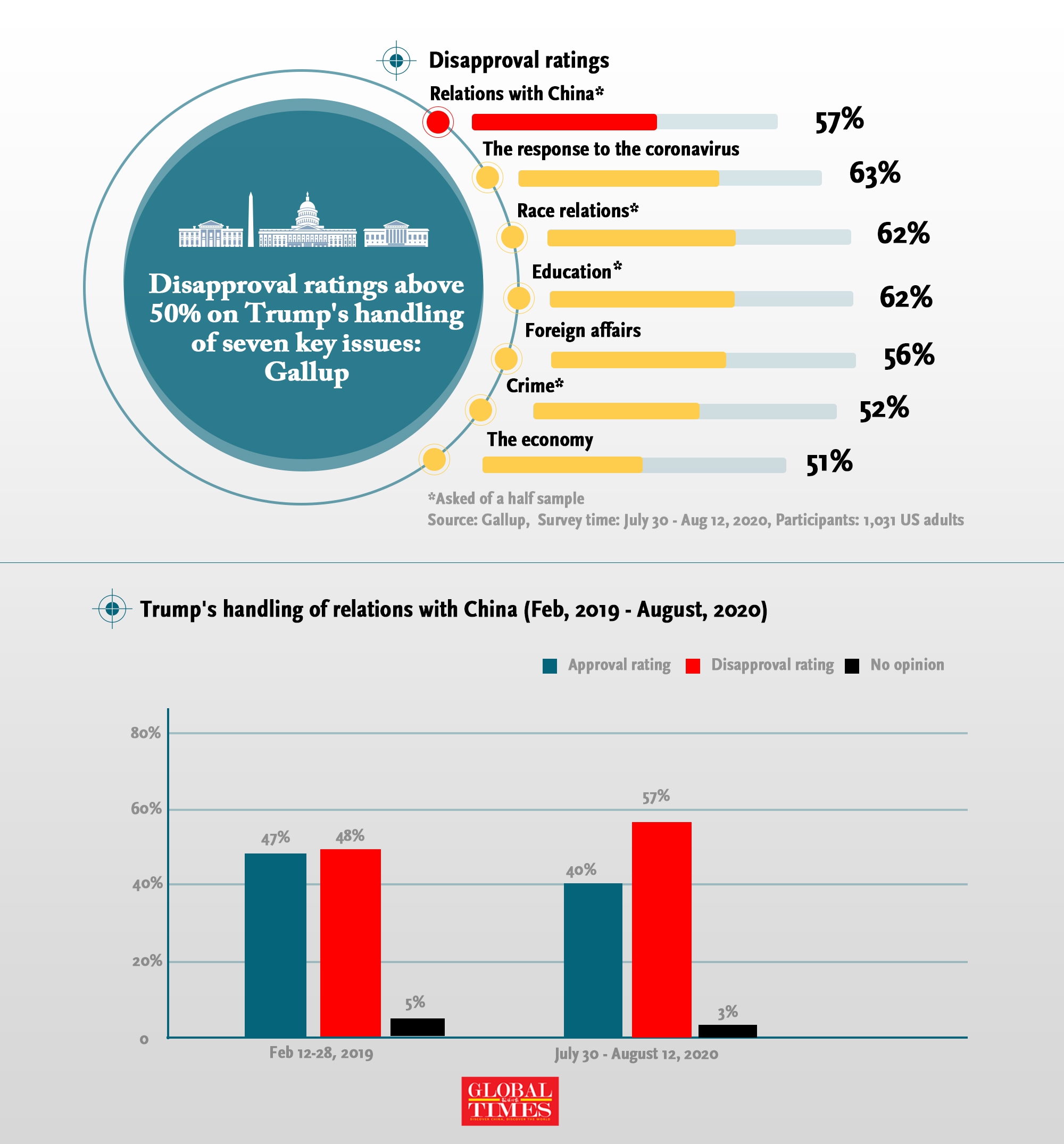
Democratic presidential nominee Joe Biden (left) and US President Donald Trump. Photo: Xinhua
The Trump administration has stepped up its security and economic game by further playing the China card to boost his reelection odds, as the campaigns heat up. Chinese analysts predicted that Donald Trump will continue to exert extreme pressure on China, but stressed that China has no intention of meddling in the US election, and will not "work in with his performances" when it comes to China's core interests.
In a latest series of moves, US politicians have created an intense atmosphere by portraying China as a national security enemy with their old tricks - espionage accusations and market access barrier.
On Monday, US Director of National Intelligence John Ratcliffe told Fox News that China poses "a greater national security threat" to the US "than any other nation," detailing a web of threats that includes "election influence and interference."
Fox News claimed that China's "anti-Trump election meddling" raised new alarm in the US, as congressional Democrats like House Speaker Nancy Pelosi and House Intelligence Committee Chairman Adam Schiff, who have issued dire warnings about Russian meddling ever since 2016, "have not been quite so vocal" about China's potential to interfere in the 2020 election.
On Monday, local media reported that the US Department of Justice arrested and charged a former intelligence officer with the CIA and FBI for selling highly classified US secrets to China, citing court records unsealed in Hawaii.
White House Chief of Staff Mark Meadows also said on the same day that Trump has looked into banning additional Chinese-owned companies, following his decision to ban the short-video app TikTok, as these Chinese apps might collect personal information and have potential national security risks.
Casting its net beyond the Chinese technology companies, during a visit to Mankato, Minnesota, Trump also promised to create 10 million jobs in 10 months, in part by setting up tax credits for American companies that relocate manufacturing facilities to the US from China, in an apparent attempt to build support for his reelection.
"These moves only aim to win more votes. Trump's 'China card' proved effective, given the tightening race with Biden, Shen Yi, a professor of international politics at Fudan University in Shanghai, told the Global Times on Tuesday.
It is evident that what Trump and his associates did to China, whether an economic stick or political sanctions, has helped boost support, and it does not matter whether those assaults would have an effect, Shen said.
Echoing Shen, Ni Feng, the director of the Institute of American Studies at the Chinese Academy of Social Sciences, said "Trump's campaign strategy to target China has solidified his supporters, since they are mainly blue-collar workers without much education or interaction with the outside world. Most of Trump's supporters hold nativist ideologies, who regard US a superior power compared with other countries."

57% of respondents in the US disapprove of the way #Trump handles relations with China, a recent Gallup survey, carried out between July 30 to Aug 12, showed. Click the graphic for more.Photo: GT
Declining public opinion
However, a latest Gallup poll on Trump's handling of seven different issues shows that on none of these did Trump receive a majority approval. In particular, Trump's approval ratings on the economy and coronavirus response are down by at least 15 points from earlier this year.
Approval of Trump's handling of foreign affairs is also down from earlier this year, but by a smaller margin, from 48 percent in early February to 41 percent. On Trump's handling of relations with China, 57 percent said they disapproved.
The poll was conducted between July 30 and August 12 on 1,031 US adults. The question on China was newly added to the regular survey this year. In a poll conducted in February 2019, the disapproval rate was 48 percent. It has surged by 9 percentage points.
Chinese observers believe it shows that more and more policies that the Trump administration has formulated are immature, and exposed the Trump administration's double standards. More and more Americans regard them as running against the rationality that the US society has always advocated.
"One of the reasons behind the surge is that Americans disapprove of the 'new Cold War' mentality toward China, as reflected by Secretary of State Mike Pompeo's remarks," Zhao Minghao, a senior research fellow at the Charhar Institute in Beijing, told the Global Times.
The high disapproval rating also shows American discontent over Trump's ability to govern, as the trade war launched by the US which caused trade frictions and tariff increases have not only added a burden on US companies, but also led to a sharp rise in the cost to domestic consumers, Zhao said.
As the country is ravaged by a worsening pandemic, Americans have begun to realize Trump's attempt to cover up his incompetence with lies about China, he added.
Zhao's views were echoed by random interviews with some American students and office workers.
"It is wrong for Trump to aggressively target China's peripheries and contain China's rise. Trump's policy is an imperialist policy that harks back to the early 20th century," a 24-year-old American student from Columbia University told the Global Times on Tuesday.
Phil, a project manager at a Seattle-based environmental nonprofit organization, also believes Trump has adopted an increasingly zero-sum approach to relations with China in many areas of converging interests. "It's just stupid. In a long run, no one wins if the relationship is damaged," Phil said.
Vanessa, a data analyst at an international trade company in Los Angeles, said the Trump administration seems to believe that the past trajectory of US-China relations disadvantaged the US in a competition for global leadership, but this is wrong.
A survey conducted by Pew Research Center in March also showed that the majority of Americans believe the right approach to deal with issues concerning China is through negotiations.
In less than three months, voters will decide whether Trump gets another term in office. His approval rating remains below the 50 percent mark in the latest Gallup poll that has been a key indicator of reelection chance.
Americans interviewed believe a clear sign of economic recovery could give Trump a better chance at winning a second term. But judging from the Gallup poll, his future remains unclear as his ratings on handling the economy is much weaker now than earlier this year.
Shen believes that the US will continue to exert extreme pressure on China. "But China has no intention of meddling in US elections. If the US continues to play the China card and touch on the country's core interests, China will retaliate," Shen said.
Experts also pointed out that the result of the election remains unpredictable as Trump continues to get high marks from his fellow Republicans, among whom 90 percent approve, and an increase among independents at 39 percent, up from 33 percent in late June, and 34 percent in July.
Fan Anqi and Wan Lin also contributed to this story


